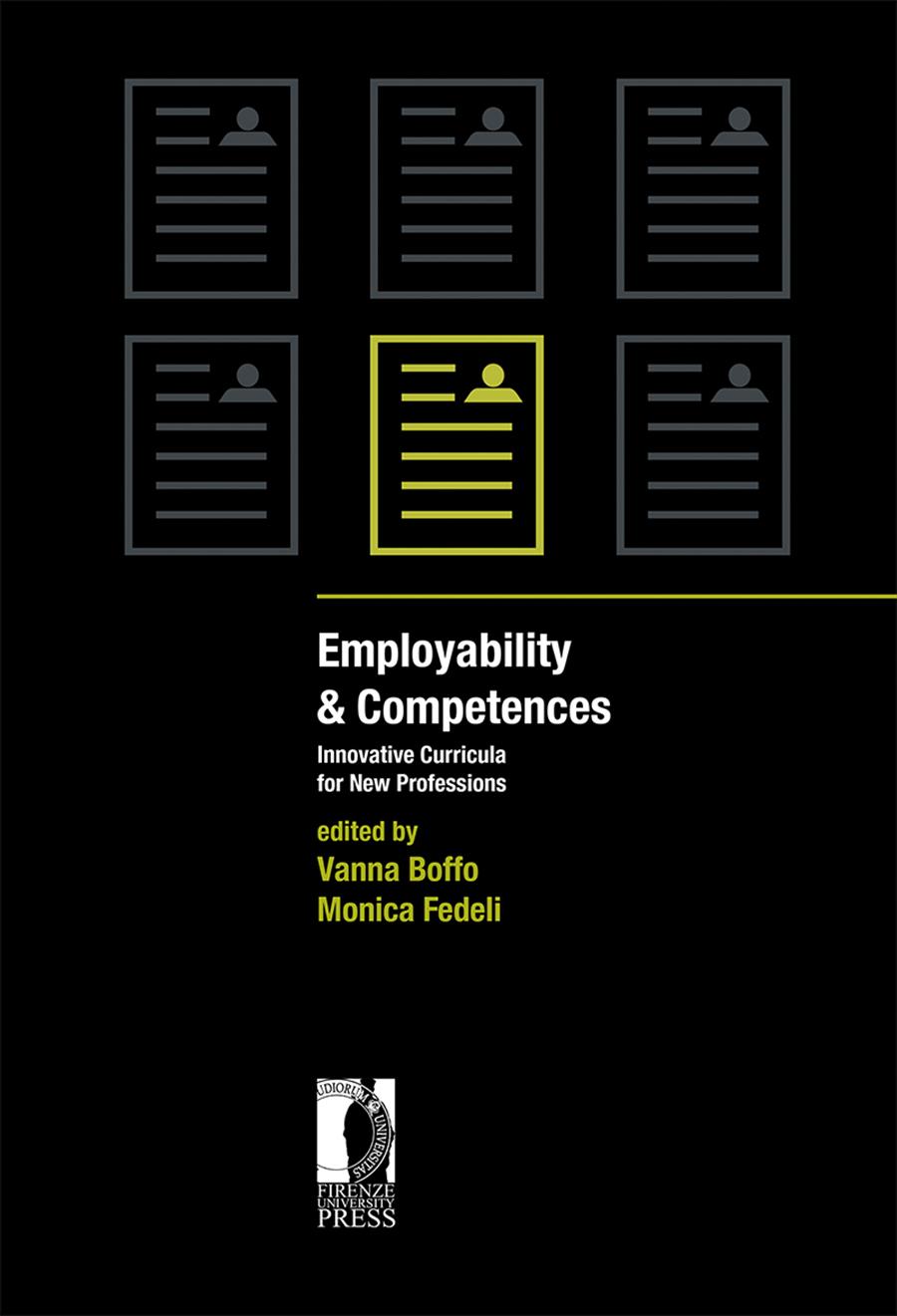- Employability & Competences
- Edited by Vanna Boffo, Monica Fedeli
The Role Model within Professional Training. The Complexity and Flexibility of Education Professions
- Giordana Szpunar
- Barbara Barbieri
- © 2018 Author(s) |
- CC BY 4.0
- DOI: 10.36253/978-88-6453-672-9.29
Sapienza University of Rome, Italy - ORCID: 0000-0002-2502-4039
University of Cagliari, Italy
- Alastra V., Kaneklin C. and Scaratti G. 2012, La formazione situata. Repertori di pratica, FrancoAngeli, Milano.
- Bauman Z. 1999, La società dell’incertezza, il Mulino, Bologna.
- Beck U. 2000, La società del rischio. Verso una seconda modernità, Carocci, Roma.
- Beck U. 2000b, Il lavoro nell’epoca della fine del lavoro, Einaudi, Torino.
- Benbassat J. 2014, Role modeling in medical education: the importance of a reflective imitation, «Academic Medicine», 89, 550-554.
- Bourdieu P. 1980, Le sens pratique, Les Editions de Minuit, Paris.
- Brookfield S.D. 1986, Understanding and facilitating adult learning, Jossey-Bass, San Francisco.
- Cruess, S.R., Cruess, R.L. and Steinert, Y. 2008, Role modelling-making the most of a powerful teaching strategy, «British Medical Journal», CCCXXXVI (7646), 718-721. DOI: 10.1136/bmj.39503.757847.BE
- Forti D. and Varchetta G. 2001, L’approccio psicosocioanalitico allo sviluppo organizzativo, FrancoAngeli, Milano.
- Fromme H.B., Bhansali P., Singhal G., Yudkowsky R., Humphrey H. and Harris I. 2010, The qualities and skills of exemplary pediatric hospitalist educators: a qualitative study, «Academic Medicine», LXXXV (12), 1905-1913.
- Jochemsen-van der Leeuw, R.H.G.A., van Dijk N., van Etten-Jamaludin F.S. and Wieringa-de Waard, M. 2013, The attributes of the clinical trainer as a role model: a systematic review, «Academic Medicine», 88, 26-34.
- Kenny N.P., Mann K.V. and MacLeod H. 2003, Role modeling in physicians’ professional formation: reconsidering an essential but untapped educational strategy, «Academic Medicine», LXXVIII (12), 1203-1210.
- Kenny N.P., Mann K.V. and MacLeod H. 2003, Role modeling in physicians’ professional formation: reconsidering an essential but untapped educational strategy, «Academic Medicine», LXXVIII (12), 1203-1210.
- Kerka S. 1998, New perspectives on mentoring, «ERIC Digest», 194, 1-7.
- Kolb D.A. 1984, Experiential learning: experience as the source of learning and development, Prentice Hall, Englewood-Cliffs.
- Krueger R.A. 1994, Focus groups: a practical guide for applied research, Sage Publications, Thousand Oaks.
- Lave J. and Wenger, E. 1991, Situated learning. Legitimate peripheral participation, Cambridge University Press, Cambridge.
- Maccario D. (ed.) 2009, L’educazione difficile. La didattica nei contesti socioculturali e trasversali, Carocci Faber, Roma.
- Mclnerney D.M., Roche, L., Mclnerney V. and Marsh H.W. 1997, Cultural perspectives on school motivation. The relevance and application of goal theory, «American Educational Research Journal», 34, 207-236.
- Mezirow J. 1991, Transformative dimensions of adult learning, Jossey-Bass, San Francisco.
- Morgan D.L. and Krueger, R.A. 1998, Planning focus groups (Vol. 2), Sage, Thousand Oaks.
- Mortari L. 2009, Ricercare e riflettere. La formazione del docente professionista, Carocci, Roma.
- Rullani E. and Vicari S. 1999, Introduzione: sistemi ed evoluzioni nel management, in Rullani E. and Vicari S. (Eds.), Sistemi ed evoluzioni nel management, Etas, Milano.
- Salerni A., Sposetti, P. and Szpunar G. 2013, La narrazione scritta come elemento di valutazione del tirocinio universitario, «Ricerche di Pedagogia e Didattica – Journal of Theories and Research in Education», VIII (2), 9-26.
- Schön D.A. 1987, Educating the reflective practitioner: towards a new design for teaching and learning in the professions, Jossey-Bass, San Francisco.
- Stagi L. 2000, Il focus group come tecnica di valutazione. Pregi, difetti, potenzialità, «Rassegna italiana di valutazione», 20, 61-82.
- Szpunar G. and Renda E. 2015, Educatori non si nasce. Una riflessione sul ruolo del tirocinio nella formazione delle competenze per il lavoro socio-educativo, «Formazione, lavoro, persona», V (15), 149-159.
- Tramma S. 2008, L’educatore imperfetto. Senso e complessità del lavoro educativo, Carocci Faber, Roma.
- Vino A. 2001, Sapere Pratico, Guerini e Associati, Milano.
- Weick K. 1995, Sensemaking in organizations, Sage Publications, Inc, Thousand Oaks.
- Wenger E. 1999, Communities of practise: learning, meaning, and identity, Cambridge University Press, Cambridge.
- Wright S., Wong A. and Newell C. 1997, The impact of role models on medical students, «Journal of General Internal Medicine», 12, 53-56.
- Wright S. 1996, Examining what residents look for in their role models, «Academic Medicine», LXXI (3), 290-292.
- Wright S. and Carrese J.A. 2002, Excellence in role modeling: insight and perspectives from the pros, «CMAJ», CLXVII (6), 638-643.
- Wright S., Kern D.E., Kolodner K., Howard D.M. and Brancati F.L. 1998, Attributes of excellent attending-physician role models, «The New England Journal of Medicine», 339, 1986-1993.
- Zucchermaglio C. 2007, Il tirocinio in psicologia: la costruzione di interazioni ai confini, «Psicologia sociale», II (3), 441-444.
Chapter Information
Chapter Title
The Role Model within Professional Training. The Complexity and Flexibility of Education Professions
Authors
Giordana Szpunar, Barbara Barbieri
Language
English
DOI
10.36253/978-88-6453-672-9.29
Peer Reviewed
Publication Year
2018
Copyright Information
© 2018 Author(s)
Content License
Metadata License
Bibliographic Information
Book Title
Employability & Competences
Book Subtitle
Innovative Curricula for New Professions
Editors
Vanna Boffo, Monica Fedeli
Peer Reviewed
Number of Pages
510
Publication Year
2018
Copyright Information
© 2018 Author(s)
Content License
Metadata License
Publisher Name
Firenze University Press
DOI
10.36253/978-88-6453-672-9
ISBN Print
978-88-6453-671-2
eISBN (pdf)
978-88-6453-672-9
eISBN (xml)
978-88-9273-119-6
Series Title
Studies on Adult Learning and Education
Series ISSN
2704-596X
Series E-ISSN
2704-5781
